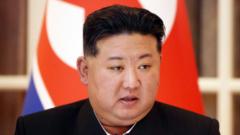North Korean state media has reported a successful test of two new air defense missiles under the supervision of leader Kim Jong Un. The Korean Central News Agency (KCNA) highlighted the weapons' “superior combat capability,” asserting that they utilize "unique technology," though specifics on the missiles were not disclosed. The recent testing, which took place on Saturday, was said to demonstrate the projectiles’ effectiveness against various aerial threats, including drones and cruise missiles.
The missile test has coincided with escalating military interactions on the Korean Peninsula. Hours before the missile test, South Korea confirmed it had fired warning shots at North Korean soldiers who crossed the Demilitarized Zone (DMZ) for a brief period. Reports indicate that approximately 30 North Korean troops crossed this heavily fortified border, prompting a response from the United Nations Command.
In retaliation, Pyongyang accused Seoul of engaging in “deliberate provocation.” This exchange is part of broader ongoing military exercises conducted by South Korea and the United States in the region. Additionally, South Korea's newly-elected President Lee Jae Myung is slated to meet with U.S. President Donald Trump in Washington, aiming to improve inter-Korean relations which have been strained.
Despite Lee’s campaign promises to enhance diplomatic ties, the sister of Kim Jong Un has already dismissed efforts for reconciliation from the South Korean government. Moreover, Kim has previously denounced the joint U.S. and South Korean military drills, calling them "most hostile and confrontational" and has vowed to expedite North Korea's nuclear weapons development.
In January, North Korea also claimed to have successfully launched a new intermediate-range ballistic missile equipped with a hypersonic warhead, which aimed to ensure its security interests in the Pacific. Concerns have also emerged regarding reports of North Korea receiving missile technology from Russia, purportedly in exchange for military support toward Russia's actions in Ukraine. There are ongoing investigations into whether the latest missile tests involved Russian technology.
North Korea remains one of the globe’s most oppressive regimes, with the Kim dynasty governing the nation for decades. The Korean Peninsula has been divided since the conclusion of the Korean War in 1953, a conflict that technically remains unresolved due to the lack of a peace treaty, despite years of absence from direct military confrontation between the two Koreas.
The missile test has coincided with escalating military interactions on the Korean Peninsula. Hours before the missile test, South Korea confirmed it had fired warning shots at North Korean soldiers who crossed the Demilitarized Zone (DMZ) for a brief period. Reports indicate that approximately 30 North Korean troops crossed this heavily fortified border, prompting a response from the United Nations Command.
In retaliation, Pyongyang accused Seoul of engaging in “deliberate provocation.” This exchange is part of broader ongoing military exercises conducted by South Korea and the United States in the region. Additionally, South Korea's newly-elected President Lee Jae Myung is slated to meet with U.S. President Donald Trump in Washington, aiming to improve inter-Korean relations which have been strained.
Despite Lee’s campaign promises to enhance diplomatic ties, the sister of Kim Jong Un has already dismissed efforts for reconciliation from the South Korean government. Moreover, Kim has previously denounced the joint U.S. and South Korean military drills, calling them "most hostile and confrontational" and has vowed to expedite North Korea's nuclear weapons development.
In January, North Korea also claimed to have successfully launched a new intermediate-range ballistic missile equipped with a hypersonic warhead, which aimed to ensure its security interests in the Pacific. Concerns have also emerged regarding reports of North Korea receiving missile technology from Russia, purportedly in exchange for military support toward Russia's actions in Ukraine. There are ongoing investigations into whether the latest missile tests involved Russian technology.
North Korea remains one of the globe’s most oppressive regimes, with the Kim dynasty governing the nation for decades. The Korean Peninsula has been divided since the conclusion of the Korean War in 1953, a conflict that technically remains unresolved due to the lack of a peace treaty, despite years of absence from direct military confrontation between the two Koreas.

















